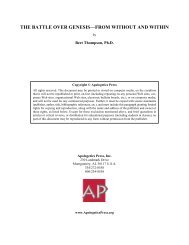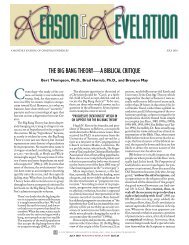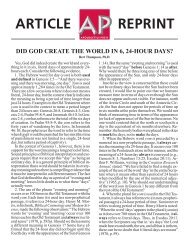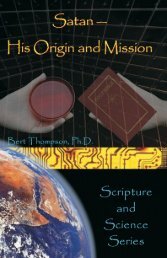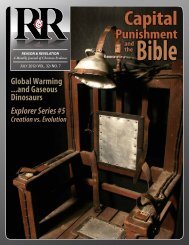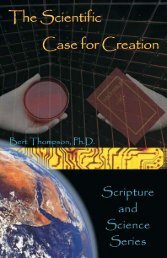The Many Faces, and Causes, of Unbelief - Apologetics Press
The Many Faces, and Causes, of Unbelief - Apologetics Press
The Many Faces, and Causes, of Unbelief - Apologetics Press
Create successful ePaper yourself
Turn your PDF publications into a flip-book with our unique Google optimized e-Paper software.
This latter observation needs a little amplification.<br />
In both Matthew 13:58 <strong>and</strong> Mark 6:6, the term “unbelief”<br />
is preceded by the definite article (ten), literally,<br />
therefore, “the unbelief <strong>of</strong> them.” Now the Greek<br />
article is sort <strong>of</strong> like an index finger, it points to, draws<br />
attention to, an object. Here, it calls attention to the<br />
fact that the unbelief <strong>of</strong> these people was so strong, so<br />
downright rebellious, that Jesus would not perform<br />
many miracles in their presence in an attempt to coerce<br />
them into accepting him (1981, 1:13, emp. <strong>and</strong><br />
brackets in orig.).<br />
<strong>The</strong>se people had heard the testimony <strong>of</strong> the many “mighty<br />
works” Christ had done throughout the region, <strong>and</strong> even had<br />
witnessed some <strong>of</strong> His miracles themselves. [<strong>The</strong> text in Mark<br />
indicates that while He did not perform “many” miracles<br />
among them, He did heal some <strong>of</strong> their illnesses (Mark 6:5).]<br />
<strong>The</strong>y had the miracle-working Son <strong>of</strong> God in their midst, <strong>and</strong><br />
yet their attitude was one <strong>of</strong> such staunch stubbornness that—<br />
in spite <strong>of</strong> the evidence before them—they steadfastly refused<br />
to believe. Today, unbelief <strong>of</strong>ten is seen as a “badge <strong>of</strong> courage”<br />
to be displayed openly <strong>and</strong> worn proudly. Modern spiritual<br />
descendants <strong>of</strong> those first-century unbelievers exhibit<br />
what the Hebrew writer termed “an evil heart <strong>of</strong> unbelief”<br />
that has driven them “away from the living God” (Hebrews<br />
10:12).<br />
<strong>The</strong> Lord was happy to help those <strong>of</strong> His day whose unbelief<br />
resulted from a genuine ignorance <strong>of</strong> God’s teachings. In<br />
Mark 9:20-24, the story is told <strong>of</strong> a father who brought his son<br />
to Christ with the request that the Son <strong>of</strong> God remove the<br />
demon that had possessed the youngster from the time he<br />
was a small child. <strong>The</strong> pleading-but-not-quite-able-to-believe<br />
father implored the Lord with these words: “If thou canst do<br />
anything, have compassion on us, <strong>and</strong> help us” (9:22). Christ’s<br />
response to the man’s doubt was, “If thou canst! All things are<br />
possible to him that believeth” (9:23). <strong>The</strong>n, “straightway the<br />
father <strong>of</strong> the child cried out, <strong>and</strong> said, ‘I believe; help thou<br />
mine unbelief’” (9:24). And the Lord did just that!<br />
- 121



